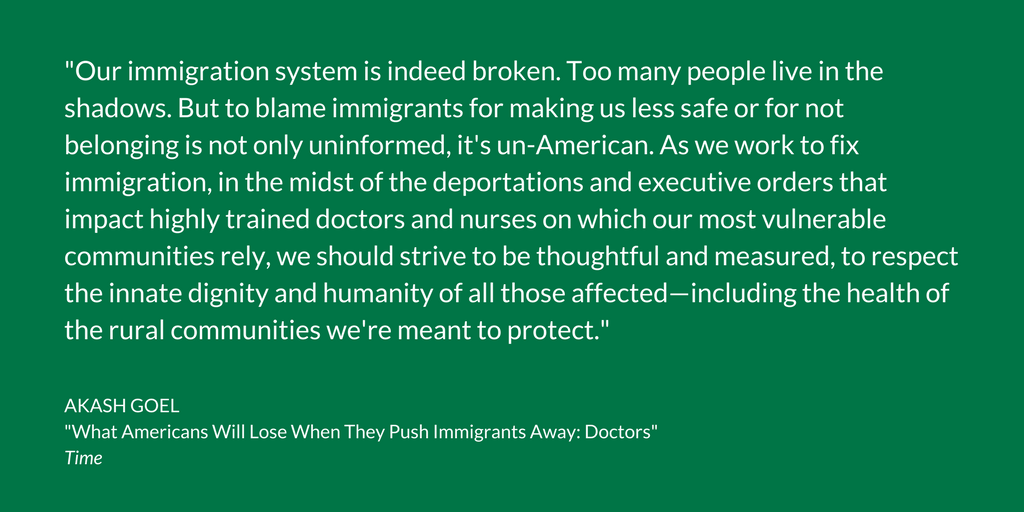Our Own Way
Dignity and Humanity
Rolling Stone: “Why Trump's Immigration Policy Is a Legal Mess”
Last week Secretary of the Department of Homeland Security (DHS) John Kelly released two memos aimed at detailing how his department would implement President Trump’s executive orders on immigration. While the memos confirm and clarify fears about the intention of the executive orders, as Matthew Bray noted, they fail to answer some fundamental questions about how the administration will prioritize its use of resources if nearly everyone is a priority. Additionally, legal experts already believe there are ways that these orders, just like the travel ban, could be successfully challenged in court. Omar Jadwat, director of the ACLU's Immigrants' Rights Project, and Camille Mackler, director of legal initiatives for the New York Immigration Coalition, detail in an interview with Rolling Stone what could be several potential legal problems with Trump's immigration policy.
It Would Impede Access to a Lawyer
What the memo says: Immigrants arriving from a contiguous country—that is, Mexico or Canada—can be returned to that country, no matter where they're originally from, "pending the outcome of removal proceedings."
What an expert says: This involves due process—and due process is a right guaranteed under the Fifth Amendment. "The Supreme Court has held that you're entitled to a lawyer in your immigration court proceedings…How are you going to ensure that the due process protections of immigration proceedings are upheld if you're forcing somebody to be in a foreign country, appearing via video?" Mackler says. "Just as a practical matter, how is a lawyer supposed to represent somebody when they are that far away?"
It Would Lead to Quicker Deportations Without a Hearing
What the memo says: With exceptions only for unaccompanied minors and political asylees, DHS plans to make undocumented or improperly documented immigrants eligible for "expedited removal"–deportation without any kind of hearing–if they have been in the US for less than two years. This changes a policy that held that only immigrants apprehended within 100 miles of the border and fourteen days of their arrival were eligible for expedited removal.
What an expert says: This could lead to another potential Fifth Amendment violation. "Expedited removal is a big due process problem," Jadwat says. "The notion that you could basically deport somebody and then give them a hearing later about whether you should have deported them seems totally contrary to any basic notion of even logic."
It Would Bring Back Secure Communities, a Problematic and Abandoned Bush-era Deportation Program
What the memo says: DHS calls for the reinstatement of Secure Communities, a deportation program created by former President George W. Bush that used local and state law enforcement to detain non-citizens. Former President Obama replaced this program with the Priorities Enforcement Program, which prioritized more serious criminals for deportation.
What an expert says: Secure Communities was abandoned because "the government was consistently losing in court, and courts were repeatedly disapproving of the way the federal government was using detainers," Jadwat says. "There's a big footnote in [the DHS memo ending Secure Communities] that basically explains: Here are a bunch of the cases that have gone against us, which is a big part of the reason we're changing from S Com to PEP."
It Could Violate Privacy Rights of Immigrants
What the memo says: DHS intends to create an office that would provide the victims of crimes perpetrated by undocumented immigrants with information about the offender's "immigration status and custody status, and [an assurance] that their questions and concerns regarding immigration enforcement efforts are addressed." President Trump has also stated in an executive order that it would distribute a weekly list of criminal actions committed by undocumented immigrants, a move that is likely to further provoke anti-immigrant sentiment.
What an expert says: These proposals could be challenged on privacy concerns. "Suspending the Privacy Act rules for anyone except US citizens and green card holders—that had actually been found...to not be practicable because it's very, very hard from an agency standpoint to track when somebody becomes a green card holder or US citizen for the purposes of figuring out whether the Privacy Act applied to them or not," Mackler says. "The privacy violations, and potential of [the government] exposing themselves to libel and slander or anything like that by the publication of these weekly and monthly reports [are significant].”
While President Trump’s immigration policy is ostensibly designed to prevent terrorists from entering the US and keep Americans safe, since President Trump’s election, there has been a dramatic increase in reports of hate crimes across the US. The recent shooting of Srinivas Kuchibhotla and Alok Madasani, two immigrants from India, by Adam Purinton, has led many to suggest that President Trump’s anti-immigrant policy and rhetoric has produced a climate of hostility toward foreigners in the US. Purinton, who was thrown out of the bar where Kuchibhotla and Madasani were drinking after he called them ethnic slurs and suggested that they did not belong in the United States, returned a short time later and fired on the two men, as well as another man who tried to apprehend the gunman. The attack, which killed Kuchibhotla, is being investigated as a possible hate crime. The gunman reportedly said later that he believed he had killed two citizens of Iran, one of the seven-predominately Muslim countries included in Trump’s travel ban.
The White House strongly rejected the idea of a link between the shooting and the administration’s anti-immigrant language and policy. Madasani, who was injured but survived the attack, calls the shooting “an isolated incident that doesn’t reflect the true spirit of Kansas, the Midwest and the United States.”



